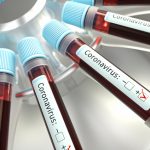NEW YORK (Reuters Health)—The ongoing novel coronavirus pandemic has raised concerns about whether biologic therapy could make psoriasis patients more susceptible to SARS-CoV-2, the virus behind COVID-19.
Mark Lebwohl, MD, from Icahn School of Medicine at Mount Sinai Hospital in New York and colleagues address this issue in a letter in the Journal of the American Academy of Dermatology.1
At this stage, specific data about susceptibility to the virus is lacking, but data on infectious complications for biologic therapies from pivotal trials for psoriasis can provide some guidance when deciding whether to continue biologic therapy during pandemics, they write.
The authors provide a comparison of overall infection rates, as well as upper respiratory infections (URTI) and nasopharyngitis, for different biologics relative to placebo based on the trial data.
With tumor necrosis factor (TNF) alpha blockers, for example, overall infections and URTI were increased by up to 7% compared with placebo, except for etanercept, which showed no increase.
With ustekinumab, which blocks interleukin (IL) 12 and IL-23, there was a small increase in overall infections but not in URTI. IL-23 blockers showed increases in overall infections up to 9%, but URTI were increased only slightly in some trials, but not at all in other trials.
IL-17 blockers showed increases in overall infections by up to 11%, but much of that increase could be accounted for by increases in monilial infections. URTIs were increased by only small amounts for secukinumab, but not for ixekizumab or brodalumab.
Dr. Lebwohl and colleagues acknowledge, “It is difficult to extrapolate from these data to susceptibility to coronavirus infection, and this analysis is further flawed by small numbers of infections and short placebo-controlled periods. Moreover, minor respiratory infections may be under-reported, and some infections may be reported doubly as upper respiratory infections and as nasopharyngitis.”
“Nonetheless, this data may be used to decide whether to continue biologic therapy during pandemics. We do not know if biologic therapies render patients more susceptible to coronavirus, but we know that in a pre-coronavirus era, respiratory infection rates were comparable to placebo. Conversely, discontinuation of some biologics can result in loss of response when treatments are reintroduced or even result in the formation of antibodies to the discontinued biologic. All of these factors must be considered when advising patients about continuing or discontinuing biologic therapies,” the authors conclude.
In a separate letter in the journal, Dr. Vivian Shi of the University of Arizona, Tucson, and colleagues review considerations for addressing patient concerns surrounding immunomodulator/immunosuppressant use in dermatology in the setting of COVID-19.2


